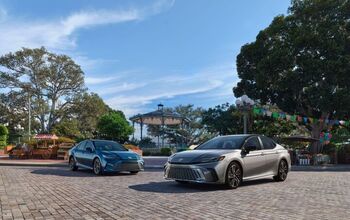Driverless Cars Are Coming, But Will Cities Be Ready?

Probably not.
According to a study by the National League of Cities, only 6 percent of future city plans consider the potential impact autonomous vehicles will have in the next few years, including driverless car lanes and scaling back parking as ride-share services become more popular.
The study collected transportation plans of the 50 biggest U.S. cities, as well as the most-populous cities in every state. In all, 69 city plans were amassed and studied for future traffic and road plans.
Despite automakers rushing to put autonomous cars on the road by 2020, the study suggests that many cities won’t be able to adequately accommodate those cars, nor will they adapt fast enough to changing transportation modes that may challenge conventional public transportation and infrastructure wisdom.
The study also found that 50 percent of city plans call for more roadways and construction, despite fewer Vehicle Miles Traveled and changing work schedules among Millennials, which will become the largest workforce demographic when Baby Boomers retire.
“Many transportation plans which project outcomes decades into the future focus almost exclusively on the problem of automobile congestion and prescribe increased infrastructure in the form of new roads as the primary cure. However, experts and trends point to a future that will be increasingly multi-modal,” the study’s authors wrote.
By 2020, according to the study, local governments will be forced to consider VMT-based fees for tax collection. Already, Oregon is using a pilot program to calculate road use based on VMT, the study points out. Other municipalities and states may follow suit with their own versions to help offset the costs of expensive roadways and fewer drivers using them.
The gas-tax-system-for-road-improvement-dollars death spiral will continue faster as more electric cars hit the road too, according to the study.
Only 10 years later, the study suggests, fully autonomous cars will be commonplace and fewer single-occupant cars will use the roads as public and private mass transit become more popular.
(Rush hour apparently won’t exist in 2030 as millennials now work 20 hours a day to live in many cities including Austin and Denver, I guess.)
In all, the study concludes that the next 15 years of transportation will change quicker than the last 30 years because of rapid advancements in technology and the popularity of denser urban centers, where cars and parking lots just get in the way of single-speed fixies.
The whole report from the NLC can be found here.

More by Aaron Cole
Latest Car Reviews
Read moreLatest Product Reviews
Read moreRecent Comments
- Canam23 I've rented them and found them...fine. I wish Ford had continued with or came up with a new generation Fusion which was a far better sedan.
- MaintenanceCosts The ES will do well in an electric version, assuming it's more thoroughly baked than the half-finished RZ. There's plenty of the Lexus customer base who use planes whenever they travel and don't need to drive their own cars outside the metro area.
- Legacygt It was more than 20 years ago that the Bangle designed BMW sedans started looking a little bit awkward. But the lineup today is chock full of downright ugly vehicles. This is one of them.
- Jeff It does state in this article that Europeans as well as Americans have cooled on EVs. I can see push back from consumers on the 2035 deadline for EVs in Europe and in states like California. I have no problem with manufacturers offering EVs but many for at least now don't want EVs. Maybe GM instead of planning to do away with the Malibu to make more EVs, GM should have offered the Malibu as a hybrid only like Toyota is offering the Camry for 2025. It would cost GM a lot less to offer a hybrid Malibu and it would outsell any EV that plant would produce. I even think GM would increase sales of the Malibu as a hybrid only and more competitive pricing.
- Kwik_Shift_Pro4X I fell asleep looking at that image.

































Comments
Join the conversation
The less the idiots "plan", the better. The only outcome of "city planning", will be that the technology that actually does get developed, wants to move in a different direction that what the planners planned for. And then, to save face, the dimbulb progressive planners (are there any who are not?) will, as usual, resort to throwing the legal code at the actual future and those capable of creating it.
I do believe this comment is assabout; "Despite automakers rushing to put autonomous cars on the road by 2020, the study suggests that many cities won’t be able to adequately accommodate those cars, nor will they adapt fast enough to changing transportation modes that may challenge conventional public transportation and infrastructure wisdom." The comment should read; "Auto makers don't have the technology to construct autonomous cars to suit existing infrastructure". Like everything in todays world we must utilise existing infrastructure when engineering and designing for the future. A lack of existing infrastructure is also the reason behind the poor takeup of EVs, natural gas powered vehicles, etc. Why should billions be spent (subsidized via tax) to pay for these industries. Like the existing infrastructure it will take many decades to change to suit these newer technologies. If these newer technologies are not flexible enough to adapt the existing infrastructure, then they are no good at all. This stuff should really be articles of interest in a Popular Science magazine.